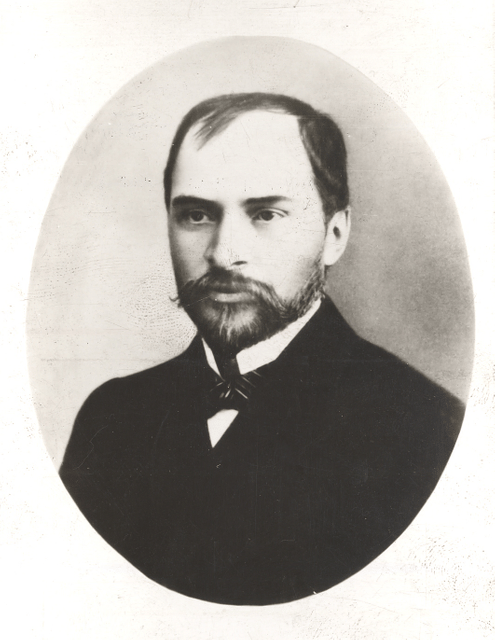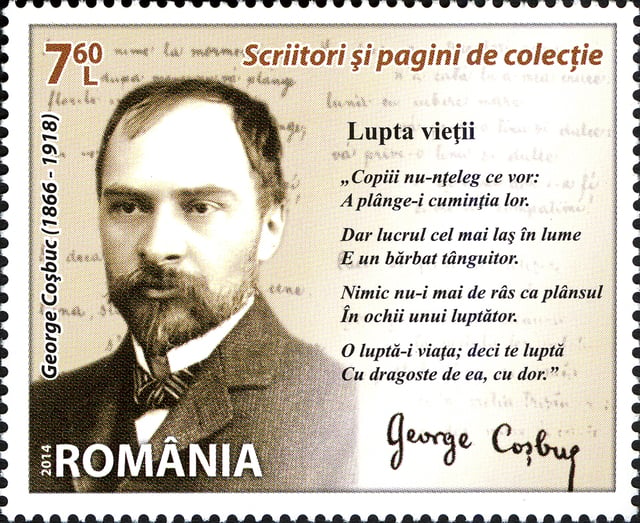George Coșbuc

George Coșbuc
George Coșbuc (Romanian pronunciation: [ˈd͡ʒe̯ord͡ʒe koʃˈbuk]; 20 September 1866 – 9 May 1918) was a Romanian poet, translator, teacher, and journalist, best remembered for his verses describing, praising and eulogizing rural life, its many travails but also its occasions for joy.
Coșbuc was born in Hordó (Romanian: Hordou, since known as Coșbuc), in Beszterce-Naszód County, Hungary (now: Bistriţa-Năsăud County, Romania) and died in Bucharest. Although his work was later co-opted by Communist propagandists to embellish Marxist-Leninist rhetoric marginalizing intellectuals while emphasizing "the alliance between peasants and the laboring class", he is still widely regarded as a master of verse, accomplished translator and loving chronicler of the Romanian human and geographical topography.
Biography
Early life
His father Sebastian Coșbuc, a Greek Catholic priest looked up to by his parish, drew from a line reputed to have yielded fourteen consecutive generations of priests. George attended primary school and graduated to secondary classes in the neighboring village of Telcs (now: Telciu). He happily took to the scholarly bent encouraged by his father, earning the praise of instructors and being chosen among the few who were to sign up for advanced courses at Liceul Românesc (Romanian Lyceum), a higher learning academy in the town of Naszód (now: Năsăud). He soon found himself doubling as teacher.
He began tearing through the library of the institution, impressing colleagues with his encyclopedic inclinations, and joined a local literary club, the Virtus Romana Rediviva, an association his father frowned upon as a deviation for a prospective career as clergyman. In 1884, already a well-loved teacher at the age of 24, he published his very first poems in the yearly almanac of the literary club.
First works
Coşbuc began attending courses at the University of Kolozsvár (now: Cluj-Napoca) in 1884, while collecting fairy tales and popular stories, which he rewrote and published to local success. He became so popular that three years later, he was asked to become editor in chief of the main Kolozsvár Romanian newspaper, Tribuna.
He soon published what widely became known as his first masterpiece, Nunta Zamfirei ("Zamfira's Wedding") to enthusiastic praise in Romanian literary circles. He moved to Romania, Bucharest, the capital, and the center of cultural discourse. His contributes to the periodical Convorbiri Literare to consistent acclaim. In collaboration with other former educators, he pieced together a praised Romanian language textbook: Carte românească de citire (the "Romanian Book of Reading").
1890s

George Coșbuc on a 2014 Romanian stamp
In 1893, he published Balade și idile ("Ballads and Pastorals") a volume which cemented his reputation. He began dabbling in poetry with political subtext, penning the emphatic Noi vrem pământ ("We Demand Land"), Lupta vieții ("Life's struggle"), and overviewes the debut of yet another literary magazine, Vatra. In 1895, he married Elena Sfetea.
He completed the first Romanian translation of Virgil's Aeneid in 1896, and also published a collection of various poems and short stories, Versuri și proză ("Verses and Prose"). His output as a translator is astonishing: within the span of three years, he published large portions of Kalidassa's Sanskrit Abhignānashākuntala (a part of them through German translations), and a new Romanian translation of Homer's Odyssey. Coşbuc also undertook the translation of various works by Friedrich Schiller. The Romanian Academy deemed him an "outstanding member" in 1898. He further contributed to literature by completing, a decade later, the epic effort of translating Dante Aligheri's Divine Comedy in its entirety.
Later life
In December 1901, he joined Alexandru Vlahuță in founding and, until 1905, editing the influential magazine Sămănătorul, a traditionalist publication appealing to those intellectuals who could claim peasant roots. After more than a decade of tremendous success as an author, he experienced personal tragedy in 1915, when his only son, Alexandru, died in a car accident. Heartbroken, Coșbuc ceased all work. He is buried at Bellu cemetery.
